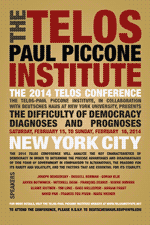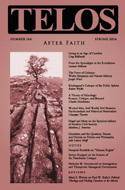In this short video introduction, Telos editor Russell A. Berman discusses the themes and concerns of Telos 167 (Summer 2014): Are We Postsecular? You can read Russell’s full introduction here, and the issue itself is available for purchase in our online store.
|
The following paper was originally prepared for the Eighth Annual Telos Conference, held on February 15–16, 2014, in New York City. The following paper was presented at the Eighth Annual Telos Conference, held on February 15–16, 2014, in New York City. Kierkegaard is the first to call modern Christians “pagans.” If Augustine’s critique of the Physicalists in the City of God was the last critique of ancient pagan time, Kierkegaard’s critique of our present “abstract infinity” is the first critique of modern pagan time. Augustine and Kierkegaard are like bookends on the complex sacred time of the Middle Ages. At the recent Telos Conference in New York City, Telos Editor Russell A. Berman discussed the themes of the upcoming issues of the journal. Telos 166 (Spring 2014), which is now available, is entitled “After Faith” and addresses the endurance of religion despite the movement toward secularization. Telos 167, coming this summer, takes the related question “Are We Post-Secular” as its theme, and brings together a variety of contributions from around the world. Telos 166 (Spring 2014) is now available for purchase in our store. This is the first of three papers delivered at a seminar on religion and politics that was organized with Rowan Williams, the former archbishop of Canterbury, on the occasion of his recent book Faith in the Public Square. The seminar was held at Radboud University in December 2013. The second and third papers will be posted in the near future. Rowan Williams’ book Faith in the Public Square, which is based upon several lectures, should not be read as a compendium of political theology, but instead as a “series of worked examples of trying to find the connecting points between various public questions and the fundamental beliefs about creation and salvation” (p. 2). I read the book as an attempt by Williams to provide the reader with themes, thoughts, and questions which are relevant to current debates about what kind of society we want to construct, how we should deal with pluralism, and how we might engage with any conflict between the religious and the secularist in contemporary society. And that is exactly what it does. |
||||
|
Telos Press Publishing · PO Box 811 · Candor, NY 13743 · Phone: 212-228-6479 Privacy Policy · Data Protection Copyright © 2025 Telos Press Publishing · All Rights Reserved |
||||
 In this paper, I will try to show the positive potential of religion for democracy in light of some theoretical and practical considerations. At the theoretical level, a debate on the proper relation of religion to politics has taken place between certain “liberal” political theorists who are suspicious of religion for good historical reasons and a number of Christian authors who argue that religion can enrich our public life.[1] One such author, David Hollenbach, S.J., bases his argument on an approach to the common good—defined in Catholic teaching as “the sum of those conditions of social life which allow social groups and their individual members relatively thorough and ready access to their own fulfillment”[2]—that he discerns at the Second Vatican Council (1962–65) and calls “dialogic universalism.”[3]
In this paper, I will try to show the positive potential of religion for democracy in light of some theoretical and practical considerations. At the theoretical level, a debate on the proper relation of religion to politics has taken place between certain “liberal” political theorists who are suspicious of religion for good historical reasons and a number of Christian authors who argue that religion can enrich our public life.[1] One such author, David Hollenbach, S.J., bases his argument on an approach to the common good—defined in Catholic teaching as “the sum of those conditions of social life which allow social groups and their individual members relatively thorough and ready access to their own fulfillment”[2]—that he discerns at the Second Vatican Council (1962–65) and calls “dialogic universalism.”[3]  According to the secularization thesis, religious faith should have long ago disappeared, overwhelmed by the forces of progress. Yet while explicit membership in denominational communities is certainly less an obligatory feature of contemporary culture than it was a generation or two ago, modes of religion still play important roles in aspects of social life. This issue of Telos explores some of the ramifications of this afterlife of faith.
According to the secularization thesis, religious faith should have long ago disappeared, overwhelmed by the forces of progress. Yet while explicit membership in denominational communities is certainly less an obligatory feature of contemporary culture than it was a generation or two ago, modes of religion still play important roles in aspects of social life. This issue of Telos explores some of the ramifications of this afterlife of faith. 

